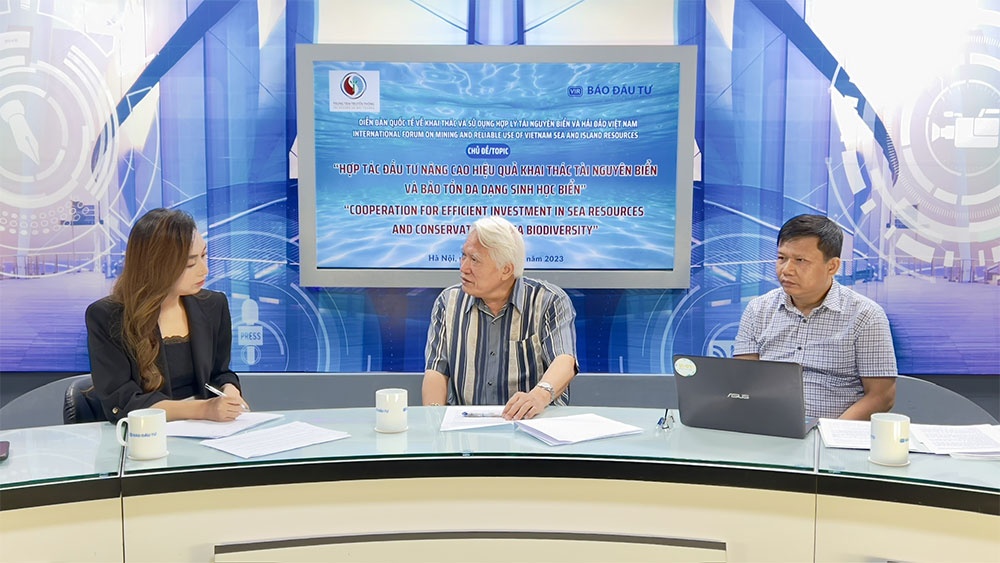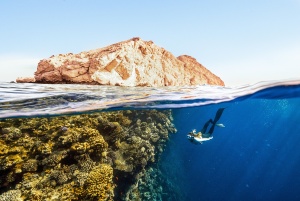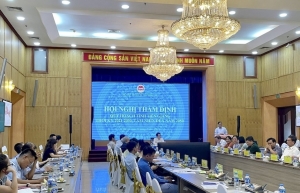Blue economy offering up future growth
 |
| Vietnam has the chance to take advantage of its massive biodiversity potential, experts insist, photo Chi Cuong |
In a talk show last week on cooperation for efficient investment in sea resources and conservation of biodiversity hosted by VIR, Nguyen Chu Hoi, vice chairman of the Vietnam Fisheries Association, confirmed that parts of Vietnam’s long coastline have great potential for marine economic development, particularly in the maritime, seafood, and industrial sectors, as well as oil and gas, tourism, and renewable energy.
“The blue economy has developed very rapidly in recent years. In addition, the current world trend is the conservation and sustainable use of oceans, seas, and marine resources for sustainable development being implemented in many countries. These are all favourable contributing factors to the sustainable development of the blue economy in Vietnam,” Hoi noted.
According to the Ministry of Natural Resources and Environment (MoNRE), Vietnam’s coastal provinces and cities account for more than half of the country’s population, and most of the labourers work in sea-related occupations. The contribution of 28 coastal provinces and cities to the nation’s GDP has now exceeded 60 per cent.
Le Dai Thang, deputy head of the Division of Natural Resources Control and Environmental Protection of Seas and Islands at the General Department of Seas and Islands under the MoNRE, said that recognising the potential, the government has issued a number of key policies with a view to supporting the sustainable development of the marine economy.
Such policies include the strategy for the sustainable development of Vietnam’s marine economy towards 2030 and vision to 2045, the national action plan on management of plastic waste discharged into the sea, and a new strategy on sustainable exploitation and use of natural resources and protection of seas and islands.
“The government determines the objectives of rational exploitation of sea and island resources and uses them effectively in order to contribute to the rapid and sustainable development of marine and coastal economic sectors, especially the key marine economic sectors,” Thang said.
Marine spatial planning is a key task assigned by the prime minister to the General Department of Seas and Islands. The marine spatial planning is based on the principle of zoning based on the ecology and usage needs of marine economic sectors, with an inter-regional and inter-local nature, Thang said.
Meanwhile, Miquel Angel P. Martorell, founder of MQL Sustainable Tourism Services, said that the blue economy is essentially taking the marine environment as a catalyst, based on the conservation of the natural capital of the sea, including resources and especially marine biodiversity ecosystems.
“We need to exploit how to sustainably save resources to ensure energy security and food security. The capacity of the natural environment, the pace of urban growth, and tourism development must all be evaluated carefully,” Martorell suggested, adding that the blue economy must be based on the application of green tech when intervening in the development of the marine economy.
“Sustainable growth is required and must be coordinated with a number of other variables. The human approach, contact between tourists, and carrying capacity as well as green vision are all important considerations. We shall pay the price in the not-too-distant future if we do not,” Martorell added.
 | Citi report explores significance of sustainable ocean economy Citi has released a new report that analyses the importance of oceans to the planet and highlights why businesses and financial institutions should care about their sustainability. |
 | Tien Giang master plan: marine and urban economy as growth engines The Mekong Delta province of Tien Giang will plan a new development along the Tien River as an important urban axis of the Ho Chi Minh City region, connecting to small tourist towns and river islands. |
What the stars mean:
★ Poor ★ ★ Promising ★★★ Good ★★★★ Very good ★★★★★ Exceptional
Related Contents
Latest News
More News
- $100 million initiative launched to protect forests and boost rural incomes (January 30, 2026 | 15:18)
- Trung Nam-Sideros River consortium wins bid for LNG venture (January 30, 2026 | 11:16)
- Vietnam moves towards market-based fuel management with E10 rollout (January 30, 2026 | 11:10)
- Envision Energy, REE Group partner on 128MW wind projects (January 30, 2026 | 10:58)
- Vingroup consults on carbon credits for electric vehicle charging network (January 28, 2026 | 11:04)
- Bac Ai Pumped Storage Hydropower Plant to enter peak construction phase (January 27, 2026 | 08:00)
- ASEAN could scale up sustainable aviation fuel by 2050 (January 24, 2026 | 10:19)
- 64,000 hectares of sea allocated for offshore wind surveys (January 22, 2026 | 20:23)
- EVN secures financing for Quang Trach II LNG power plant (January 17, 2026 | 15:55)
- PC1 teams up with DENZAI on regional wind projects (January 16, 2026 | 21:18)

 Tag:
Tag:



















 Mobile Version
Mobile Version